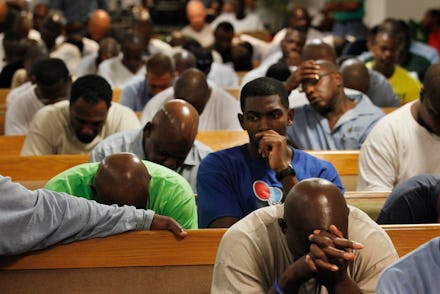The Disturbing Piece of Our Justice System That's Hurting Black Americans

As sentient human beings, as Americans, and as members of society, we have a moral and emotional need to believe that our judicial system is functional and fair.
It's disconcerting to think that two men who commit identical crimes would face different punishments at the hand of the law. Because, after all, when someone commits a crime, the system should be a clean, fair and measurable process. But it's not. And this is largely because of something troubling that looms at each step, something that can save or destroy you. And it can be summed up in one word: discretion.
We might not want to believe it, but the legal system does not only deliver justice according to law, it also employs justice according to discretion. This is problematic because it opens the door to biases, some we may not even be conscious of. As William J. Stuntz wrote in his book The Collapse of American Criminal Justice, "Discretionary justice too often amounts to discriminatory justice." Ta-Nehisi Coates recently wrote in the Atlantic, "Humans tend to have biases, and the systems we construct often reflect those biases. … Citing racism in our justice system isn't mere shaming, it's a call for a humility and self-awareness, which presently evades us." They might seem like big statements to make, but they can be broken down and applied step by step.
According to FBI data from Stunz's book, there were about 23 million felonies in 2008. But American police officers and prosecutors, who operate with limited resources, only convict about 1.1 million felonies per year. As a result, "The criminals who pay the highest price for their crimes will be those who are most cheaply caught and convicted. This dynamic inevitably produces discriminatory punishment," Stunz wrote. (Image credit: AP)
Who is getting caught more frequently, and why? According to Stunz, 10% of black adults and 9% of white adults use illegal drugs, but black people are nine times more likely to serve prison sentences for drug crimes. The fact that they could be dealing drugs more than whites "might explain some of that gap but not most of it, much less all," he wrote.
After the discretion of the police officer, it's on to the discretion of the prosecutor.
First, a prosecutor decides the initial charges to bring, which directly impacts the type of punishment the defendant could face. For example, if a person commits a burglary, and a gun is found in the car that transported him to the crime scene, the prosecutor could choose to add a charge of carrying a firearm to the crime. This would make the burglary a "crime of violence," which could add five years to the sentence. Conversely, the prosecutor could choose to be lenient and forget the gun. Prosecutors might be incentivized to be lenient for a variety of reasons, such as feeling pressure to maximize convictions or sentences, or wanting to reduce their workload and risk by encouraging guilty pleas.
Thus enters the famous guilty plea. The overwhelming majority of criminal convictions, at 96%, are by guilty pleas, the majority of which are the result of plea bargains. It's not known how many innocent people are pleading guilty, but conservative estimates place the number at 2-5%, which translates to tens of thousands of innocent people behind bars today. Here's an illustration of how that looks: Since 1989, 316 people have been exonerated with post-conviction DNA evidence; 63% were black. Twenty-nine of the 316 had pleaded guilty to a crime they didn't commit, and of those, again, 63% were black. So, black people comprised a considerable majority of people both exonerated and people exonerated who had pleaded guilty.
Until this point in our delineation, the law has not defined a consistent and fair procedure, but rather "a menu of options for police officers and prosecutors to use as they see fit," Stunz wrote. And we haven't even gotten to the sentencing yet.
In a study titled, "Racial Disparity in Federal Criminal Charging and Its Sentencing Consequences," researchers found that on average, black defendants receive almost 10% longer sentences than whites arrested for the same crimes, with all variables controlled. "At least half this gap can be explained by initial charging choices, particularly the filing of charges carrying mandatory minimum sentences," they wrote. "Prosecutors are, ceteris paribus [all things being equal], almost twice as likely to file such charges against blacks."
Unconsciously biased or even downright racist decisions are made at each step along the way, but rarely can they be tied to any one person. "The system as a whole may discriminate massively, but as no single decision-maker is responsible for more than a small fraction of the discrimination, the law holds no one accountable for it," Stunz wrote. (Image credit: AP)
It's time to revisit the promise of the 14th Amendment, which calls for equal protection of laws. If this seems obvious, it's because it is: Two people should not face different outcomes for the same crime. But they do, and too often, it's because of the color of their skin.